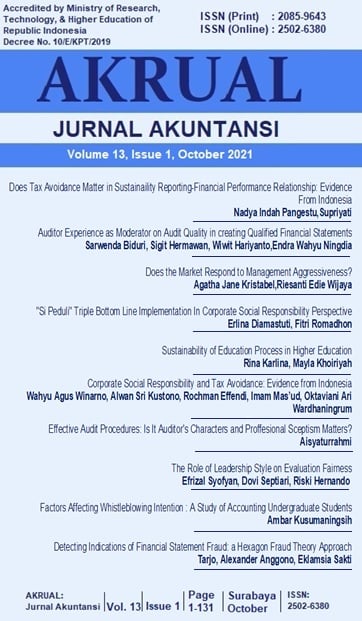Corporate Social Responsibility and Tax Avoidance: Evidence from Indonesia
DOI:
https://doi.org/10.26740/jaj.v13n1.p69-82Keywords:
corporate social responsibility, CSR investment, state equity ownership, tax avoidanceAbstract
This study examines the effects of state equity ownership on the relationship between corporate social responsibility investment and tax avoidance. Using a 474 firm-year observation sample of Indonesian companies from 2015 to 2018, we use the ordinary least square and subgroup analysis regressions to estimate the model with various proxies for tax avoidance. The results show that the companies with higher CSR investment have lower tax avoidance behavior in various proxies. In other words, companies with higher social responsibility performance will make lower tax savings. Furthermore, companies with state equity ownership have a lower relationship between CSR spending activities and tax avoidance than nonSEO companies. This research has several implications: First, this study uses total CSR expenditure as a proxy for CSR investment. Further research can create categories based on the type or dimension of CSR. Second, the research sample for state equity ownership is very small, and the next research can use a paired sample. This paper highlights the implication of CSR investment on taxation in Indonesia, and its findings have implications for regulators. Regulators can encourage the company's CSR activities, but the impact of these activities may differ depending on each company's motives, especially tax avoidance.
References
Bird, R., & Davis-Nozemack, K. (2018). Tax Avoidance as a Sustainability Problem. Journal of Business Ethics, 151(4), 1009-1025. doi:10.1007/s10551-016-3162-2
Brune, A., Thomsen, M., & Watrin, C. (2019). Family firm heterogeneity and tax avoidance: The role of the founder. Family Business Review, 32(3), 296-317.
Col, B., & Patel, S. (2019). Going to Haven? Corporate Social Responsibility and Tax Avoidance. Journal of Business Ethics, 154(4), 1033-1050. doi:10.1007/s10551-016-3393-2
Col, B., & Patel, S. (2019). Going to Haven? Corporate Social Responsibility and Tax Avoidance. Journal of Business Ethics, 154(4), 1033-1050. doi:10.1007/s10551-016-3393-2
Fan, J. P. H., Wong, T. J., & Zhang, T. (2007). Politically connected CEOs, corporate governance, and Post-IPO performance of China's newly partially privatized firms. Journal of financial economics, 84(2), 330-357. doi:https://doi.org/10.1016/j.jfineco.2006.03.008
Frynas, J. G., & Stephens, S. (2015). Political corporate social responsibility: Reviewing theories and setting new agendas. International Journal of Management Reviews, 17(4), 483-509.
Gaaya, S., Lakhal, N.,& Lakhal, F. (2017). Does family ownership reduce corporate tax avoidance? The moderating effect of audit quality. Managerial Auditing Journal, 32(7), 731-744. doi:10.1108/MAJ-02-2017-1530
Goerke, L. (2019). Corporate social responsibility and tax avoidance. Journal of Public Economic Theory, 21(2), 310-331. doi:10.1111/jpet.12341
Gulzar, M. A., Cherian, J., Sial, M. S., Badulescu, A., Thu, P. A., Badulescu, D., & Khuong, N. V. (2018). Does Corporate Social Responsibility Influence Corporate Tax Avoidance of Chinese Listed Companies? Sustainability, 10(12). doi:10.3390/su10124549
Hanlon, M., & Heitzman, S. (2010). A review of tax research. Journal of accounting and economics, 50(2), 127-178. doi:https://doi.org/10.1016/j.jacceco.2010.09.002
Hoi, C. K., Wu, Q., & Zhang, H. (2013). Is corporate social responsibility (CSR) associated with tax avoidance? Evidence from irresponsible CSR activities. The accounting review, 88(6), 2025-2059.
Jia, M., & Zhang, Z. (2013). Managerial ownership and corporate social performance: Evidence from privately owned Chinese firms' response to the Sichuan earthquake. Corporate Social Responsibility Environmental Management, 20(5), 257-274.
Kim, J., & Im, C. (2017). Study on Corporate Social Responsibility (CSR): Focus on Tax Avoidance and Financial Ratio Analysis. Sustainability, 9(10). doi:10.3390/su9101710
Lanis, R., & Richardson, G. (2015). Is Corporate Social Responsibility Performance Associated with Tax Avoidance? Journal of Business Ethics, 127(2), 439-457. doi:10.1007/s10551-014-2052-8
Li, W., & Zhang, R. (2010). Corporate Social Responsibility, Ownership Structure, and Political Interference: Evidence from China. Journal of Business Ethics, 96(4), 631-645. doi:10.1007/s10551-010-0488-z
Malik, M., Al Mamun, M., &Amin, A. (2019). Peer pressure, CSR spending, and long-term financial performance. Asia-Pacific Journal of Accounting & Economics, 26(3), 241-260. doi:10.1080/16081625.2018.1493933
Muttakin Mohammad, B., & Subramaniam, N. (2015). Firm ownership and board characteristics: Do they matter for corporate social responsibility disclosure of Indian companies? Sustainability Accounting, Management and Policy Journal, 6(2), 138-165. doi:10.1108/SAMPJ-10-2013-0042
Nollet, J., Filis, G., & Mitrokostas, E. (2016). Corporate social responsibility and financial performance: A non-linear and disaggregated approach. Economic Modelling, 52, 400-407. doi:https://doi.org/10.1016/j.econmod.2015.09.019
Nuvaid, V., Sardar, S., & Chakravarty, S. (2017). CSR as Investment: An Analysis of Ownership Structure and Firm Performance. In B. Kamaiah, C. S. Shylajan, S. V. Seshaiah, M. Aruna, & S. Mukherjee (Eds.), Current Issues in Economics and Finance(pp. 113-123). Singapore: Springer Singapore.
Scott, W. R. (2015). Financial Accounting Theory (Seventh Edition ed.): Pearson Education Canada.
Sharma, S., Durand, R. M., & Gur-Arie, O. (1981). Identification and analysis of moderator variables. Journal of marketing research, 18(3), 291-300.
Subramaniam, N., Kansal, M., & Babu, S. (2017). Governance of Mandated Corporate Social Responsibility: Evidence from Indian Government-owned Firms. Journal of Business Ethics, 143(3), 543-563. doi:10.1007/s10551-015-2804-0
Tang, P., Yang, S., & Boehe, D. (2018). Ownership and corporate social performance in China: Why geographic remoteness matters. Journal of Cleaner Production, 197, 1284-1295. doi:https://doi.org/10.1016/j.jclepro.2018.06.288
Watson, L. (2015). Corporate social responsibility, tax avoidance, and earnings performance. The Journal of the American Taxation Association, 37(2), 1-21.
Widiastuty, E., & Soewarno, N. (2019). CSR Expenditure and Company Performance: Charity or Signal? Evidence from Indonesia. Quality Innovation Prosperity, 23(3), 22-37.
Winarno, W. A. (2007). Corporate Social Responsibility: Pengungkapan Biaya Lingkungan. Jurnal Akuntansi Universitas Jember, 5(2), 72 -86.
Downloads
Published
How to Cite
Issue
Section
License
Copyright (c) 2021 AKRUAL: Jurnal Akuntansi

This work is licensed under a Creative Commons Attribution-NonCommercial 4.0 International License.
 Abstract views: 3163
,
Abstract views: 3163
, PDF Downloads: 2382
PDF Downloads: 2382


















